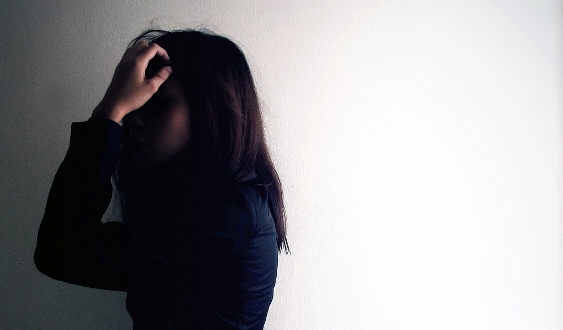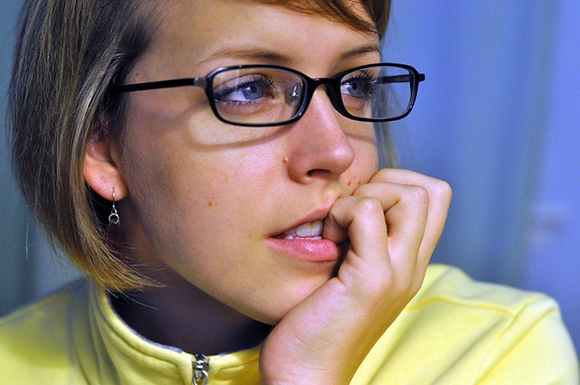In the movie Fight Club, Edward Norton’s character says, “Losing all hope was freedom.”
It’s a quote that strikes you, because it deals with two important concepts—hope and freedom—and pits them against each other in a way you wouldn’t expect. We naturally think of hope as a positive thing, as we do freedom, but this says that losing hope brings freedom.
Is it a nonsensical or brilliant quote?
Based on my experience, it’s brilliant. Losing hope has been my most unexpected lifesaver.
My Mental Breakdown
I struggled with severe anxiety 3-4 years ago. The onset was abrupt.
Up until the age of 25, I was the healthiest person I knew. I never got sick, could play basketball six hours straight, and always felt great. That changed suddenly in 2011. I woke up with an itchy spot on my chest one morning, looked down, and saw two small fang marks. A spider bite. After a few more minutes, the toxins set in and I started convulsing a little bit, so my dad took my to the ER. They gave me a steroid shot in the butt and antibiotics to prevent infection. Such wonderful memories.
Long story short, the whole experience shook me, the antibiotics seemed to mess with my biochemistry or something, and I developed severe health anxiety, constantly worrying about what would happen next. Also, there’s something scary about feeling vulnerable in the time you are most vulnerable—while sleeping! Spider bites are rare, right? I shouldn’t have worried about it, right? I thought so too until another spider bit me a few days after the first one did! Luckily, my body didn’t react so… emphatically to the second bite, but it still made me paranoid.
I went from being calm to only knowing how to be really anxious. It was a strange and unexpected slippery slope of worrying, not getting enough sleep, being scared to sleep, and freaking out because I was freaking out. Meanwhile, I hoped for it all to go back to the way it was. I had never hoped for something so much in my life.
Hope’s Dark Side
Hope has a dark side in the way that it impacts the mind. It’s an intense yearning for something to happen: You hope to get into your favorite college. You hope to find love one day. You hope to overcome the pesky problem that’s weighing you down. You hope to overcome anxiety or depression. You hope the Detroit Lions will (please) just win one Super Bowl.
Hope can become an ironic mental prison by its mere intensity and dominance of your mind.
“Letting Go”
As an author, I’ve studied the self-help book market quite a bit, and one of the most popular, best-selling topics I’ve noticed is that of “letting go.”Last I checked, several of the top 20 self-help books were about letting go of one thing or another. There are multiple ways of saying it, but many books are based around this topic (My new book, How To Be An Imperfectionist, aims to help people let go of perfectionism.
Letting go of whatever dominates your mind (including hope) instantly frees it to think of warm breezes, the beauty of friendship, and the simplicity of enjoying a meal. We lose out on these small joys of life when our big problems take more than their deserved mindshare.
But there’s still the issue of hope. Why would letting go of hope—something seen as positive—bring freedom and not darkness?
Why Is Losing Hope Helpful?
I beat my downward spiral because I lost hope. Nothing else worked.
When I was in the worst part of the struggle, I hoped so much for things to just go back to normal. The worse it got, the more I hoped. Why can’t this nightmare end? I hoped that my next breath would be drawn out and deep and relaxing, but it never was. I hoped to go back in time and punch that spider’s fangs out. I hoped and tried to change without success.
Hoping is a weaker form of expecting. When you expect something, you’re almost sure it will happen. When you hope for something, you don’t know it will happen, but you’d sure like it to happen. Hope and expectations are both tricky, potentially dangerous things to have, but for different reasons. Let’s focus on when hope is dangerous.
Hope is dangerous when it compels you fight a battle you can’t win. For example, in my situation, I could theoretically relax and “beat this,” so I threw the gauntlet at the problem, hoping the next thing I tried would work. For example, I tried adjusting my breathing, but I became hyper conscious about it and it made things worse.
My hope kept me fighting so hard. But fighting is not what I needed to do.
In life, like in war, we must know when to attack, and equally important, when to retreat. Not all enemies can be defeated in a straight-forward conventional way.
I remember the day I purposefully lost hope and “gave up.” I was in the kitchen, being really anxious for no reason, and I was fed up with this fight, so I decided to quit fighting. I was surprised when, over time, the enemy walked away!
Here’s specifically how I changed my behavior by losing hope: I stopped trying (and hoping) to not get butterflies in my stomach for no reason. I stopped caring about my breathing frequency and depth. I began to be playful with my problem: “Only five butterflies this time? That’s it? Give me a few more!”
Losing hope meant I stopped trying to fight the battles. And that’s how I won the war and regained my mental freedom!
I know, it’s a story as inspiring as Braveheart. But did you know this concept has been shown elsewhere?
One day, novelist Leo Tolstoy’s brother told him to sit in a corner until he stopped thinking about a white bear. Much later that day, Tolstoy remained in the corner, his mind fixated on the white bear he needed to stop thinking about. He was finally able to stop thinking about the white bear when his brother gave him permission to think about it. This experiment has been replicated, and the result is always the same: when people forbid themselves or attempt to rid their mind of something, it boomerangs back to them with alarming consistency and persistency.
“Studies show that the more you try to suppress negative thoughts, the more likely you are to become depressed.” – Kelly McGonigal, PhD.
Hope drives persistence, which is why losing hope in an area that requires retreat is so often freedom. More effort does not always bring greater results. Smarter strategies always bring greater results.
Think of an area in your life where you are trying, fighting, and hoping too hard. What would losing hope and letting go look like? This is most helpful with areas like anxiety, worry, fear, and depression. When you accept them, they lose a considerable amount of their power over you.
Photo by Akki annant






I agree that losing hope can definitely provoke freedom. I feel like it’s freedom from having to do what you’re supposed to do. In essence, your “give a damn” busts. Then you just do what is primal. I think that’s what Ed Norton was talking about in fight club.
Great post. Thanks for sharing.
You said, “In essence, your ‘give a damn’ busts.”
That’s a great summary of what it looks and feels like. I’ve since experienced this type of freedom in more areas and it’s been wonderful. When you stop caring so much about your problems, you live as you naturally would; it’s better and easier.
Thanks for the insight, Tara!
Hi Stephen – really great post. Reminds me of a quote I included in a post I recently wrote about anger:
“The more you hide your feelings, the more they show. The more you deny your feelings, the more they grow”.
Can’t remember who said it, but it’s so true. Good luck to you
Love this! Well stated.
Thank you for this post; I feel like it really may help me with the tough time I am going through at the moment.
Awesome awesome post. Loved reading it. Not only does it make some beautiful points, it also does so in a very nice, thought-provoking way. You have a good style of writing – humorous, funny and touching.